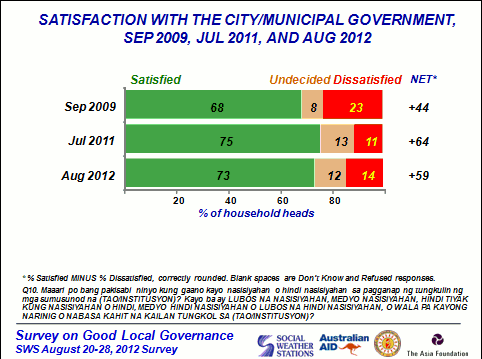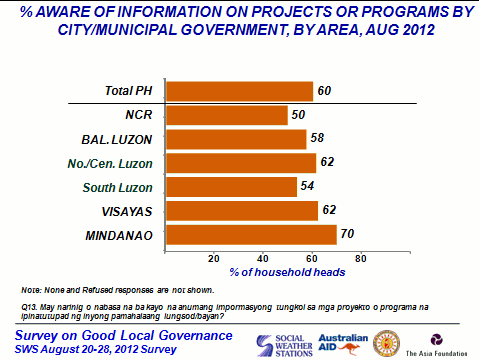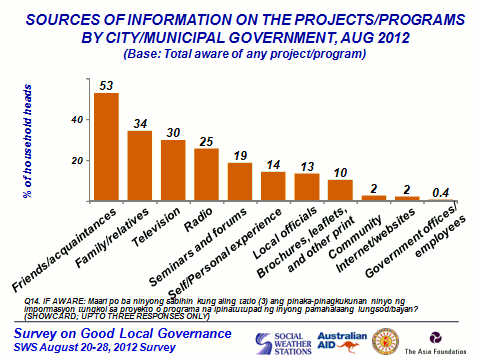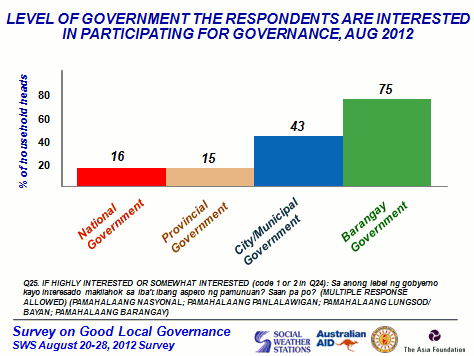SUMMARY
This is AI generated summarization, which may have errors. For context, always refer to the full article.

MANILA, Philippines – Compared to 2011, Filipinos are less satisfied with the performance of their elected local officials, despite rating their town or city government as “very good.”
This was according to the results of the 2012 Survey on Good Local Governance shared by the Department of the Interior and Local Government (DILG) on Monday, October 29.
Conducted by the researching body Social Weather Stations (SWS), the survey found that 73% of household heads are satisfied with their local government’s performance — which includes governors and all subsequent positions — while 14% are dissatisfied.
While the net satisfaction rating translates to “very good,” the results show a 5-point drop from 2011’s satisfaction rating.
The survey also showed that many Filipinos are happy with the service they are receiving from their local governments.
Of those surveyed, 77% said they consider their transactions with local government offices transparent and understandable, up from 2011’s 72%.
The DILG also received a “very good” rating — up 5 points from 2011 — as 70% of those polled said they are satisfied with its performance, and only 7% expressing dissatisfaction.
About 1,500 household heads across the country were interviewed face to face for the survey, a collaborative effort between among the DILG, SWS and The Asia Foundation.
More awareness
Majority of Filipinos expressed awareness of their local government’s projects and programs, with 60% saying they have read or heard of information about their city government’s efforts, and Mindanao expressing the most awareness.
However, 31% said they didn’t know of any projects.
Among those aware, 22% said road improvement was an ongoing program, while 17% mentioned infrastructure — both were the most mentioned projects in the survey.


Majority of households (59%) also said they are aware of their local government’s disaster preparedness efforts with a whopping 85% considering them as very effective or somewhat effective. More people (51%) also said they know about the existence of these programs compared to last year — a rise from 2011’s 46%.
Most Filipinos said they received the information on these projects first from friends and acquaintances, followed by family, television and radio. A significant 80% said they were satisfied with the information, with 12% saying they were dissatisfied.
Economic woes
Still at the top of the Filipino’s list of most important local problems are those relating to the economy, although only 30% are concerned about them, a drop from last year’s 36%.
Other problems mentioned, in order, were social services-related problems, crime, then infrastructure.
More and more Filipinos blame the local government for their locality’s problems, with 42% saying it is their responsibility to solve these — a huge rise from 31% in 2011. Only 22% say it is the national government’s responsibility to ease their troubles.
The economic outlook of respondents is also slightly down from 2011.

The good news is many Filipino said they are interested in participating in governance, with 77% of Filipino saying they would like to participate, most especially at the barangay government level.
Twenty-three percent think it is the barangay government responsible for local problems, up from 19% last year.
Optimistic Filipinos
Over the past 3 years, more Filipinos say there have personally experienced corruption or have heard about it, rising to 15% from 12%. Of those who claimed they see “a lot” of corruption, a disheartening 79% said they see it at the national level, while 68% mentioned seeing it at city levels.
The Budget Office (48%), Mayor’s Office (32%) and the Engineer’s Office (30%) are considered the most corrupt of the local government agencies.
While 26% of Filipinos said they do not know whom to report corruption to, respondents said they are more aware of anti-corruption efforts of their local government this year than last year.
Filipinos also remain optimistic that the country can be governed without corruption, with 64% expressing hope, only a one-percent drop from 2011. – Rappler.com
Add a comment
How does this make you feel?
There are no comments yet. Add your comment to start the conversation.